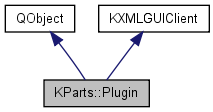KParts
KParts::Plugin Class Reference
A plugin is the way to add actions to an existing KParts application, or to a Part. More...
#include <plugin.h>

Classes | |
| struct | PluginInfo |
| Struct holding information about a plugin. More... | |
Public Member Functions | |
| virtual QString | localXMLFile () const |
| Plugin (QObject *parent=0, const char *name=0) | |
| virtual QString | xmlFile () const |
| virtual | ~Plugin () |
Static Public Member Functions | |
| static void | loadPlugins (QObject *parent, KXMLGUIClient *parentGUIClient, KInstance *instance, bool enableNewPluginsByDefault=true) |
| static void | loadPlugins (QObject *parent, const QValueList< PluginInfo > &pluginInfos, const KInstance *instance) |
| static void | loadPlugins (QObject *parent, const QValueList< PluginInfo > &pluginInfos) |
| static void | loadPlugins (QObject *parent, const KInstance *instance) |
| static QPtrList< Plugin > | pluginObjects (QObject *parent) |
Protected Member Functions | |
| virtual void | setInstance (KInstance *instance) |
Static Protected Member Functions | |
| static Plugin * | loadPlugin (QObject *parent, const char *libname) |
| static QValueList < Plugin::PluginInfo > | pluginInfos (const KInstance *instance) |
Detailed Description
A plugin is the way to add actions to an existing KParts application, or to a Part.The XML of those plugins looks exactly like of the shell or parts, with one small difference: The document tag should have an additional attribute, named "library", and contain the name of the library implementing the plugin.
If you want this plugin to be used by a part, you need to install the rc file under the directory "data" (KDEDIR/share/apps usually)+"/instancename/kpartplugins/" where instancename is the name of the part's instance.
You should also install a "plugin info" .desktop file with the same name.
- See also:
- PluginInfo
Definition at line 49 of file plugin.h.
Constructor & Destructor Documentation
| Plugin::Plugin | ( | QObject * | parent = 0, |
|
| const char * | name = 0 | |||
| ) |
| Plugin::~Plugin | ( | ) | [virtual] |
Member Function Documentation
For internal use only.
- Returns:
- The plugin created from the library
libname
Definition at line 176 of file plugin.cpp.
| void Plugin::loadPlugins | ( | QObject * | parent, | |
| KXMLGUIClient * | parentGUIClient, | |||
| KInstance * | instance, | |||
| bool | enableNewPluginsByDefault = true | |||
| ) | [static] |
Load the plugin libraries for the given instance, make the Plugin objects children of parent, and insert the plugin as a child GUI client of parentGUIClient.
This method uses the KConfig object of the given instance, to find out which plugins are enabled and which are disabled. What happens by default (i.e. for new plugins that are not in that config file) is controlled by enableNewPluginsByDefault. It can be overridden by the plugin if it sets the X-KDE-PluginInfo-EnabledByDefault key in the .desktop file (with the same name as the .rc file)
If a disabled plugin is already loaded it will be removed from the GUI factory and deleted.
This method is automatically called by KParts::Plugin and by KParts::MainWindow.
If you call this method in an already constructed GUI (like when the user has changed which plugins are enabled) you need to add the new plugins to the KXMLGUIFactory:
if( factory() ) { QPtrList<KParts::Plugin> plugins = KParts::Plugin::pluginObjects( this ); QPtrListIterator<KParts::Plugin> it( plugins ); KParts::Plugin * plugin; while( ( plugin = it.current() ) != 0 ) { ++it; factory()->addClient( plugin ); } }
Definition at line 227 of file plugin.cpp.
| void Plugin::loadPlugins | ( | QObject * | parent, | |
| const QValueList< PluginInfo > & | pluginInfos, | |||
| const KInstance * | instance | |||
| ) | [static] |
Load the plugin libraries specified by the list pluginInfos, make the Plugin objects children of parent, and use the given instance.
It is recommended to use the last loadPlugins method instead, to support enabling and disabling of plugins.
Definition at line 146 of file plugin.cpp.
| void Plugin::loadPlugins | ( | QObject * | parent, | |
| const QValueList< PluginInfo > & | pluginInfos | |||
| ) | [static] |
Load the plugin libraries specified by the list docs and make the Plugin objects children of parent .
It is recommended to use the last loadPlugins method instead, to support enabling and disabling of plugins.
Definition at line 170 of file plugin.cpp.
Load the plugin libraries from the directories appropriate to instance and make the Plugin objects children of parent.
It is recommended to use the last loadPlugins method instead, to support enabling and disabling of plugins.
Definition at line 141 of file plugin.cpp.
| QString Plugin::localXMLFile | ( | ) | const [virtual] |
Reimplemented for internal reasons.
Reimplemented from KXMLGUIClient.
Definition at line 76 of file plugin.cpp.
| QValueList< Plugin::PluginInfo > Plugin::pluginInfos | ( | const KInstance * | instance | ) | [static, protected] |
Look for plugins in the instance's "data" directory (+"/kpartplugins").
- Returns:
- A list of QDomDocument s, containing the parsed xml documents returned by plugins.
Definition at line 89 of file plugin.cpp.
| QPtrList< KParts::Plugin > Plugin::pluginObjects | ( | QObject * | parent | ) | [static] |
Returns a list of plugin objects loaded for parent.
This functions basically calls the queryList method of QObject to retrieve the list of child objects inheriting KParts::Plugin .
Definition at line 185 of file plugin.cpp.
| void Plugin::setInstance | ( | KInstance * | instance | ) | [protected, virtual] |
| QString Plugin::xmlFile | ( | ) | const [virtual] |
Reimplemented for internal reasons.
Reimplemented from KXMLGUIClient.
Definition at line 64 of file plugin.cpp.
The documentation for this class was generated from the following files:
 KDE 3.5 API Reference
KDE 3.5 API Reference